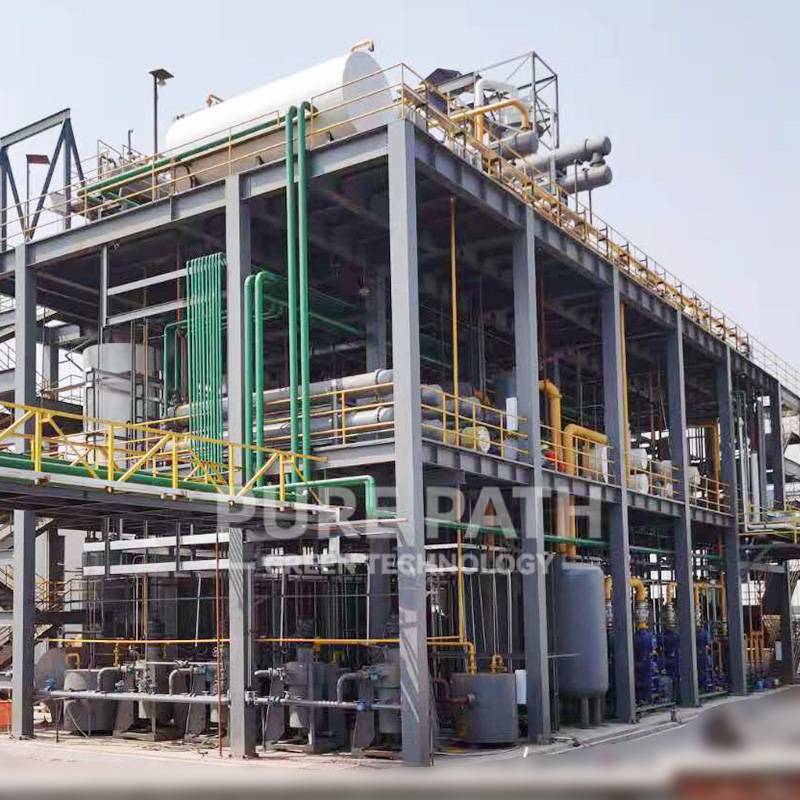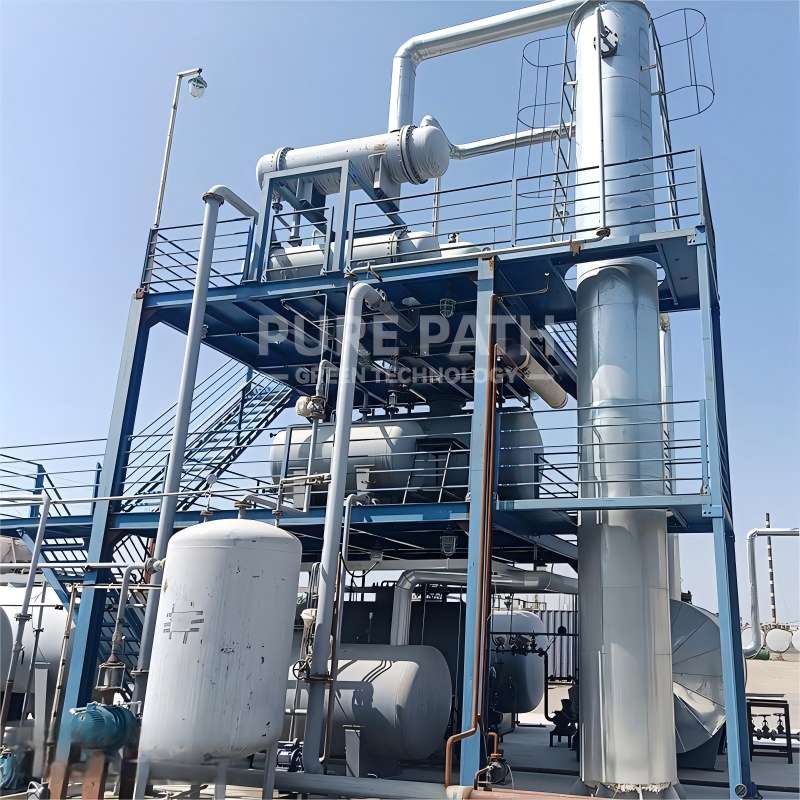Benefits of Used Engine Oil Recycling for the Automotive Industry
The automotive industry generates significant volumes of used engine oil, a potentially hazardous waste material. Recycling this resource offers a myriad of benefits, from economic savings to environmental protection. This article explores the importance of used engine oil recycling, the methods involved, and how the automotive industry can benefit.
What is Used Engine Oil Recycling?

Used engine oil recycling is the process of collecting, treating, and reprocessing oil that has been drained from vehicles and machinery after its useful life. Over time, engine oil becomes contaminated with dirt, metal shavings, and chemical byproducts, which degrade its performance and make it unsuitable for direct reuse. Rather than discarding this hazardous material, recycling restores its value by removing impurities and restoring its properties for reuse.
Recycled oil has multiple applications, such as being re-refined into high-quality lubricants or converted into industrial fuel. This practice reduces the demand for new oil production while mitigating environmental damage from improper disposal, including soil and water contamination. Recycling used engine oil is essential for promoting a sustainable and circular economy, ensuring efficient and responsible use of this finite resource.
Methods of Used Engine Oil Recycling
Recycling used engine oil involves several methods, each designed to remove impurities and restore the oil for reuse or repurpose it for other applications. Below are the most important and widely adopted methods, explained in detail:
Re-Refining to Produce Base Oil
Re-refining is the most advanced and eco-friendly approach to recycling used engine oil. This process restores the oil to its original quality, making it suitable as a base for new lubricants. The key steps involved are:
- Vacuum Distillation: The used oil is heated under reduced pressure to remove impurities and volatile contaminants.
- Hydro-Treating: The purified oil undergoes hydrogen treatment to eliminate sulfur, nitrogen, and other harmful compounds, improving its quality and performance.
- Additive Blending: After purification, additives are mixed into the oil to meet the performance standards for automotive and industrial lubricants.
This method produces high-quality lubricants that are virtually identical to those made from virgin crude oil, offering a sustainable solution.
Blending for Heavy-Duty Fuels
Used engine oil can be repurposed by blending it with other fuels, such as diesel or bunker oil, to create a fuel suitable for large-scale industrial engines. The process involves several critical steps to ensure efficiency and environmental safety:
- Oil Testing and Mixing: The used oil is tested to determine its compatibility with other fuels. Then, specific ratios of used oil are blended with compatible fuels to ensure stability and optimal performance.
- Emission Controls: To reduce harmful emissions during combustion, conditioners and stabilizers are added to the fuel blend. These additives help minimize the release of pollutants, improving air quality.
This fuel blending method is particularly beneficial in marine and heavy industrial sectors, where fuel costs are a significant expense. By using recycled engine oil, companies can reduce their reliance on virgin fuels, lowering operational costs and promoting sustainability.

Fuel Recovery for Industrial Applications
Used engine oil can be repurposed into a clean-burning fuel for industrial applications, such as powering boilers, furnaces, or power plants. The recycling process typically involves several stages to ensure the oil is suitable for combustion:
- Filtration and Centrifugation: These techniques effectively remove solid contaminants, water, and other impurities from the used oil, ensuring it is cleaner and safer for further processing.
- Heating and Conditioning: The oil is then treated at high temperatures to meet specific safety and performance standards required for industrial combustion systems.
This method offers a cost-effective alternative to traditional fuels and helps reduce waste, making it an environmentally friendly option. However, compared to re-refining, this process is less energy-efficient, as the oil’s potential is primarily focused on energy recovery rather than its reuse in high-quality lubricants or other applications. Nonetheless, it still contributes to a circular economy by providing an additional use for discarded oil.
Chemical Conversion to Raw Materials
Advanced chemical processes can convert used engine oil into valuable raw materials for a wide range of applications, such as asphalt production, plastic manufacturing, and more. The key steps in this process are:
- Thermal Cracking: The oil is heated to high temperatures, causing the long hydrocarbon chains to break down into shorter, more usable chains. This makes the oil more versatile for industrial uses.
- Catalytic Processing: Special catalysts are introduced to further refine the oil, improving its chemical properties and making it suitable for manufacturing products beyond lubricants.
By reprocessing used engine oil in this way, we not only prevent waste but also support a circular economy. This approach reduces the need for virgin raw materials and provides sustainable alternatives for industries, helping to reduce environmental impact while creating valuable resources for non-lubricant products.
Each of these methods offers unique benefits and applications, ensuring that used engine oil is not wasted but repurposed efficiently to maximize its value while minimizing environmental harm.
How Automotive Industry Benefits from Used Engine Oil Recycling

The automotive industry stands to gain significantly from the recycling of used engine oil, benefiting both economically and environmentally. Here’s how:
Economic Benefits

- Cost Savings: Recycling used engine oil reduces the need for new oil production, helping automotive companies lower costs associated with purchasing virgin oil. Re-refined oil offers a more affordable alternative to new oil, resulting in savings for both manufacturers and service centers.
- Revenue Opportunities: Automotive companies and oil service providers can generate additional revenue by selling re-refined oil or partnering with recycling firms. As demand for eco-friendly products rises, the market for reprocessed oil becomes a profitable avenue for businesses.
- Reduced Disposal Expenses: Properly recycling used engine oil helps automotive businesses avoid expensive disposal fees, which are often incurred from improper waste management or the transportation of hazardous materials. This practice can significantly lower overall operational costs.
Environmental Benefits

- Prevention of Environmental Pollution: Properly recycling used engine oil prevents contamination of soil, rivers, and groundwater. When discarded improperly, used oil can seep into the environment, causing long-term harm. Recycling mitigates this risk by ensuring the oil is safely processed and reused.
- Conservation of Natural Resources: Recycling used oil reduces reliance on crude oil, a finite resource. By re-refining and reusing oil, the automotive industry helps conserve these valuable resources, promoting long-term sustainability and reducing the need for new raw materials.
- Reduction in Carbon Emissions: The recycling process requires less energy than producing new oil from raw materials, resulting in a lower carbon footprint for the automotive industry. This reduction in energy consumption and emissions is crucial in combating climate change and enhancing the sector’s overall environmental impact.
By incorporating used engine oil recycling into their operations, automotive businesses can achieve substantial economic gains while supporting environmental sustainability, creating a more efficient and responsible industry.
Automotive Industry Best Practices for Used Engine Oil Recycling

One of the most effective ways for the automotive industry to improve used engine oil recycling is by investing in advanced oil recycling equipment. These systems ensure that the recycling process is efficient, safe, and cost-effective. Here are some key practices when investing in recycling equipment:
1. Investing in Advanced Oil Re-refining Equipment:
Investing in cutting-edge re-refining units enables businesses to effectively remove contaminants from used engine oil and restore it to a high-quality state. These systems utilize advanced distillation, filtration, and chemical processes to ensure the recycled oil meets industry standards, providing a strong long-term return on investment.
2. Automated Collection and Filtration Systems:
Implementing automated collection systems that gather used oil directly from service stations or garages helps streamline the process. These systems can be paired with filtration units that remove particulates and other impurities before the oil undergoes further processing, improving efficiency and reducing manual labor costs.
3. Investing in Waste Oil Recovery Systems:
Modern waste oil recovery systems are engineered to extract the maximum amount of usable oil from waste materials. By integrating these recovery units, automotive companies can significantly increase the volume of oil available for recycling, reducing losses and boosting overall profitability.
By focusing on high-quality, efficient oil recycling equipment, the automotive industry can enhance the recycling process, reduce costs, and contribute to sustainability goals. The upfront investment in these systems pays off in the long run by improving oil reuse rates and lowering the environmental impact of used oil disposal.
Used engine oil recycling provides clear economic and environmental benefits for the automotive industry. By investing in advanced recycling equipment, companies can reduce costs, conserve resources, and minimize waste. These practices support sustainability and contribute to a circular economy, ensuring the industry remains both economically and environmentally responsible. Embracing oil recycling is key to a cleaner, more efficient future for the automotive sector.







